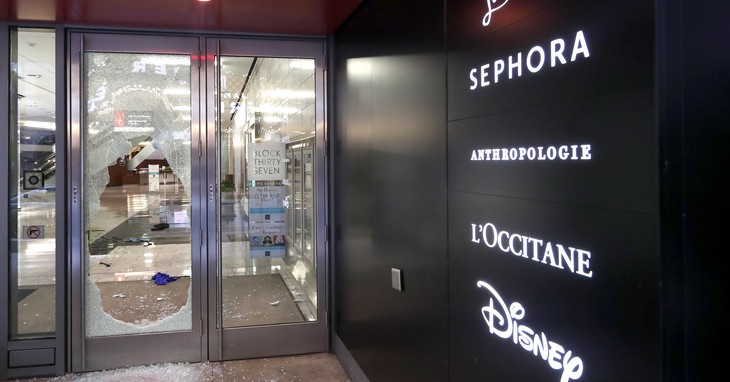The financial network seems confused as to why companies might have little interest in raising a toxic topic such as abortion.
A detail in the corporate realm that has always baffled me is the way companies have been so willing to wade out into the tall grass of social issues when the rationale behind not ginning up controversy would seem obvious. Not only are you at the risk of driving off customers, but so often, there are blatant examples to cite of other operations suffering as a result of this needless gambit.
This week — so far, at least — it appears that most corporations have wisely decided to remain taciturn about the flare-up regarding the Supreme Court being poised to repeal Roe v. Wade. Now, before heaping praise too freely, surely the cause is that there is a major example of this kind of corporate misstep still percolating in the news. Then, add to that the very unstable nature of the abortion debate itself, and it becomes more a case of looking to see which company is dumb enough to light the fuse from its public relations division.
Yet at CNBC, they seem mystified that there is a uniform silence from Wall Street to this point. Two of their writers, Melissa Repko and Lauren Feiner, were confounded that there was little to be heard from the business sector, and they were intent on finding…something.
Major companies, including Disney and Walmart, keep largely silent as leaked Supreme Court abortion draft sparks outrage https://t.co/XUAiAECxbZ
— CNBC Politics (@CNBCPolitics) May 4, 2022
Really, Disney has been silent on the matter, you say?! How this could be a surprise to anyone, let alone a business reporter, is rather mystifying. The uniform silence on this matter from boardrooms is rather obvious to anybody, except these two journalists, so they actually strove to provoke commentary.
Companies were reticent to weigh in on a leaked draft of a Supreme Court decision that would strike down abortion rights. Dozens of companies, including Walmart, American Airlines and Disney, have yet to issue statements or respond to CNBC requests for comment.
Enter ‘You Don’t Say?’ gif —> here.
Even trade groups and the US Chamber of Commerce had little to say, wisely. Abortion is the very kind of topic that has long had many a corporate spokesperson running in retreat, as there is no upside whatsoever to be had. No matter how tepid of a stance a company might take on whichever side of the issue, that positioning will be met with a backlash from the other side. Seriously, ask yourself what upside could even be realized; any commercial benefit would become countered, if not eclipsed, by the blowback.
At least the writers found someone who could deliver a sober read on the matter.
“There is no upside in speaking out alone on this. So that is why they need to work collectively,” said Jeffrey Sonnenfeld, professor and senior associate dean of the Yale School of Management. “Nobody wants to have 40% of the country mad at them.”
Disney provides the very test case for any business to look at as to how to address social issues such as this. The best way is to not respond at all. Disney elected to enter into the public discourse about the recent Florida parental rights law, and it has cost the company extensively. There was no sound reason for Disney to pick a side with a bill that had no bearing on its operations, as it concerned merely the standards set inside of classrooms and granting parents more access to the child’s curriculum.
After taking up an antagonistic position by falling prey to a minority of loud cranks and a biased media complex, Disney was met with a PR backlash, polls show a growing resentment among its customers, and the corporate stock has seen new lows. All of this was followed by the state legislature voting to pull the special provisions the company has enjoyed for decades.
There was no need at all for the company to say anything, and now there is every reason for Disney to go to work on repairs. Seeing this, and considering the explosive nature of the abortion issue, there is nothing to compel a company to come out with an official statement of any sort. But this dismays the editorial staff at CNBC.
They used five other staffers to call around to as many companies, looking to draw out a comment, getting only some wan PR comments from Yelp, and one company taking a firm stand of opposition – it was from a dating app.
Apart from this CNBC interrogation, Levi Strauss & Co. has, in fact, come out strongly in opposition. It will be interesting to watch if there are any ramifications from this, as the company has made a move to show they do not think non-birthing people, and a fair segment of females, buy blue jeans.
This is the trap that many companies have fallen into in recent years. The belief that the very small percentage on social media who bark about issues represent the greater public opinion is a farce. Also, those making the loudest complaints do not represent your customer base, for a large part. People are far quieter as they vote with their wallets, and it is something companies have realized repeatedly in recent years.

Target, the NFL, Gillette – and numerous others all the way up to current day Disney – have experienced adverse marketplace blowback following bold announcements about social issues. It is a fallacy sold by those wishing to provoke companies to exert pressure on behalf of a pet cause. They goad a corporation into action, then fail to support the same company after the fact as a segment of the dedicated customer base is driven off.
It is a pattern that has been playing out for years. Possibly we are seeing a sense of dawning coming over the corporate boardrooms and the PR departments that the best thing for them to do is also about the easiest – just don’t say anything, and you will be far better off in the end.













Join the conversation as a VIP Member